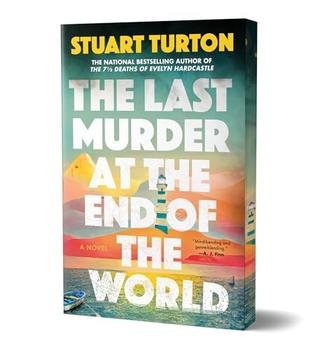Summary | Excerpt | Reading Guide | Reviews | Beyond the Book | Readalikes | Genres & Themes | Author Bio

A Novel
by Stuart Turton
Magdalene follows a paved road through a rusted iron gate, the sentry towers so overrun by vegetation they look like hedges.
The barracks looms up in front of her. It's n-shaped and four stories high, made of crumbling concrete blocks, every inch painted with jungle, flowers, and birds, animals stalking through the undergrowth. It's a fantasy land, the paradise of people who've grown up surrounded by dry earth and barren rock.
Rickety staircases and rusted balconies grant access to the dormitories inside, none of which have doors or windows in the frames. A few villagers are hanging their washing over the railings or sitting on the steps, trying to catch whatever scraps of breeze dare to clamber over the wall. Friends call to her cheerfully, but she's too anxious to respond.
"Where's Emory?" she asks, her eyes moving fretfully across the faces in front of her.
"Near the kitchen, with her grandfather."
Magdalene heads into the space between the two wings of the barracks, searching for her best friend. This used to be an exercise yard for the troops, but it's slowly been transformed into a park by three generations of villagers.
Flowers have been planted in long beds along the walls, and the old collapsed radar dish has been patched up and turned into a huge bird bath. Four rusted jeeps serve as potters for herbs, while lemon and orange trees grow out of shell casings. There's a covered stage for musical performances and an outdoor kitchen with six long tables for communal meals. Everybody eats together every night.
One hundred and twenty-two people live in the village, and most of them are in this yard. Games are being played, instruments practiced, and poems written. Performances are being rehearsed on the stage. Food is being cooked and new dishes attempted.
There's a lot of laughter.
For a second, this joy loosens Magdalene's worry. She scans the area, searching for Emory, who isn't hard to find. Most of the villagers are squat and broad-shouldered, but Emory's slighter and shorter than most, with oval eyes and a huge head of curly brown hair. She once described herself as looking like some strange species of dandelion.
"Stay still," demands Matis, peering around the statue. "I'm almost finished."
Matis is nearly sixty, which makes him the oldest man in the village. He's thick-armed, with gray whiskers and bushy eyebrows.
"I'm itchy," complains Emory, struggling to reach a spot on her upper back.
"I gave you a break half an hour ago."
"For fifteen minutes!" she exclaims. "I've been standing here with this stupid apple for six hours."
"Art always has a price," he says loftily.
Emory sticks her tongue out at him, then resumes her pose, lifting the gleaming apple into the air.
Muttering, Matis returns to his work, shaving a sliver from the sculpture's chin. He's so close to it, his nose is almost touching the stone. His eyesight has been fading for the last decade, but there's nothing we can do. Even if we could, there'd be little point. He'll be dead tomorrow.
Excerpted from The Last Murder at the End of the World by Stuart Turton. Copyright © 2024 by Stuart Turton. Excerpted by permission of Sourcebooks. All rights reserved. No part of this excerpt may be reproduced or reprinted without permission in writing from the publisher.
Your guide toexceptional books
BookBrowse seeks out and recommends the best in contemporary fiction and nonfiction—books that not only engage and entertain but also deepen our understanding of ourselves and the world around us.